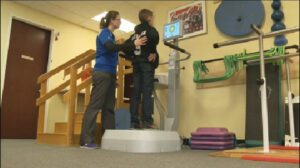GRAND BLANC (WJRT) – (12/02/15) – Concussions and the danger of them in youth sports has been a hot topic lately. In the past, a concussion could sideline your child for months – but a new piece of equipment in Grand Blanc can change that.
lately. In the past, a concussion could sideline your child for months – but a new piece of equipment in Grand Blanc can change that.
It’s a simple, quick and inexpensive test that’s changing the lives of young athletes in Mid-Michigan – and has parents feeling a lot more at ease.
“It’s OK, it’s not scary,” said Aidan Strader, a fourth grade football player who completed the test.
The Biodex machine at the Advanced Physical Therapy Center (APTC) in Grand Blanc measures the amount of sway or balance deficits that someone has, which is helpful when someone is having trouble keeping their balance, or an athlete injures their ACL.
It’s main use at APTC though is for concussions.
“There are a few other locations in Michigan that actually have the machine, but we’re the only ones in Michigan that I know of that actually use it for concussions,” said Christina Henriquez, a Physical Therapist at APTC.
First, an athlete takes the test while they’re healthy to establish a baseline of their normal stance.
“I’m mostly balancing on my right foot instead of my left foot, and I need to put more weight on my left foot,” Aidan said.
It’s about 20 seconds per test and there’s four easy tests.
“He’s only 9, so I told him, ‘You’re going to do this test, it’s kind of like playing on Wii fit,'” said Karen Strader, Aidan’s mother. “‘You’re going to balance, try to get on the center of the dot. It’s easy.'”
Once their baseline is established, if the athlete suffers a concussion, they come in one to three days after getting injured. APTC creates a therapy routine for them, and once the athlete is back to their baseline, the center can report the results to the doctor, who has the final say in giving the OK to play.
“It allows us to get them back into the field sooner than what others would think initially,” Henriquez said. “It used to be about six weeks when you could get them back onto the field, but by using this machine behind me, we’re able to get them back to baseline by using treatment methods and by using the balance system on here to actually get them back to baseline sooner.”
Cutting healing time from a possible eight weeks to a couple weeks can mean an athlete is sidelined verses out for the season.
“I think it’s definitely worth it to take the test because usually if you get a concussion or they think you have a concussion, you’re out automatically for six weeks,” said Gillian Molzon, a high school sophomore ice hockey player. “So if you take the baseline, and they think you have a concussion, you can take it and that can get you out on the ice quicker.”
It also takes the guesswork out of it for parents.
“You worry about them going back to play,” Karen said. “So if he did get a concussion during tackle football, I’d be worried, ‘Are we doing the right things for him, is he ready to go back?’ But then also you think about, ‘OK, we keep him out six to eight weeks, does he really need six to eight weeks or could he go back sooner, could he catch up to the rest of his teammates?’ You hate for him to be out if he doesn’t need to be out.”
The test is $25.
“$25 is nothing for the peace of mind,” Karen said. “So I would do that anytime. When it’s your kid, you’re going to try to do anything you can possible to try and keep them safe and healthy.”
The test takes a matter of minutes and the center recommends having the baseline completed every two or three years for a growing youth athlete.